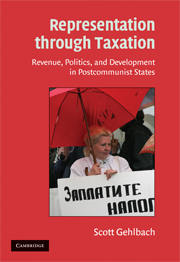Book contents
- Frontmatter
- Contents
- List of Tables
- List of Figures
- Acknowledgments
- Note on Transliteration
- 1 TAXES, REPRESENTATION, AND ECONOMIC DEVELOPMENT IN THE RUSSIAN HEARTLAND
- 2 THE CREATION OF TAX SYSTEMS
- 3 THE LOGIC OF REPRESENTATION THROUGH TAXATION
- 4 PATTERNS OF COLLECTIVE-GOODS PROVISION
- 5 REVENUE TRAPS
- 6 CONCLUSIONS
- Bibliography
- Author Index
- Subject Index
- Titles in the series
6 - CONCLUSIONS
Published online by Cambridge University Press: 31 August 2009
- Frontmatter
- Contents
- List of Tables
- List of Figures
- Acknowledgments
- Note on Transliteration
- 1 TAXES, REPRESENTATION, AND ECONOMIC DEVELOPMENT IN THE RUSSIAN HEARTLAND
- 2 THE CREATION OF TAX SYSTEMS
- 3 THE LOGIC OF REPRESENTATION THROUGH TAXATION
- 4 PATTERNS OF COLLECTIVE-GOODS PROVISION
- 5 REVENUE TRAPS
- 6 CONCLUSIONS
- Bibliography
- Author Index
- Subject Index
- Titles in the series
Summary
In Chapter 1, I promised that in telling the story of representation through taxation I would provide answers to three questions. With my story now complete, it is time to revisit those questions and to summarize my answers.
What explains variation in the tax systems that evolved after communism? Variation in tax systems in Eastern Europe and the former Soviet Union is driven by variation in three initial conditions: the industrial structure inherited from communism, distance from the West, and the level of economic development at the beginning of the postcommunist transition. Countries that inherited from communism industrial structures heavily populated with large manufacturing enterprises, as reflected in highly energy-inefficient economies, displayed greater inertia, continuing to rely as in the communist era on enterprise taxation. Countries closer to the West structured their tax systems around those of the European Union, relying more on direct taxation of individuals and less on indirect taxation than their counterparts to the east. Finally, countries that were wealthier at the beginning of transition were considerably more likely to structure their tax systems around direct taxation of individuals.
Given the high correlation among these three initial conditions — relative to Eastern Europe, countries in the former Soviet Union are more heavily endowed with large manufacturing enterprises, further from the West, and poorer — two ideal types of tax systems emerged in the postcommunist world.
- Type
- Chapter
- Information
- Representation through TaxationRevenue, Politics, and Development in Postcommunist States, pp. 155 - 164Publisher: Cambridge University PressPrint publication year: 2008



